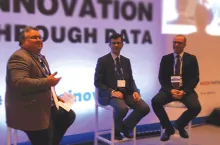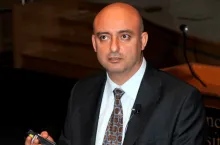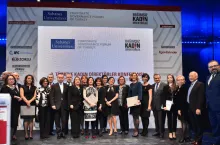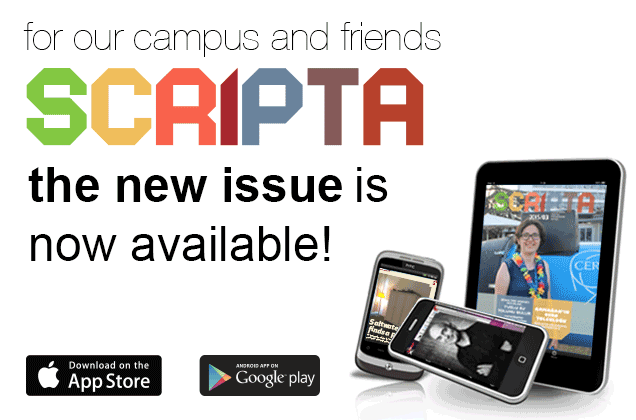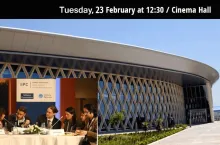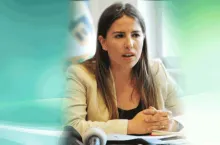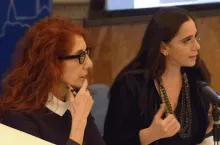The third “Independent Woman Directors Conference of Turkey” in association with IFC (International Finance Corporation), a member of the World Bank Group, and Zorlu Holding was held at the Zorlu Performing Arts Center on Wednesday, February 10th, 2016 as part of the Independent Woman Directors project implemented by the Sabancı University Corporate Governance Forum with the strategic support of Egon Zehnder International’s Turkey office.
The "2015 Report on Woman Directors in Publicly-Traded Companies in Turkey" was revealed to the public. According to the report, the ratio of women serving as members of the Board of Directors of companies traded on the Istanbul Stock Exchange increased from 11.5% to 12.9% in four years.
The third “Boards Empowered by Women” Awards were given to Türk Tuborg Bira ve Malt Sanayii, Turcas Petrol, Burçelik Vana Sanayi ve Ticaret and Sanifoam Sünger Sanayi ve Ticaret.
The “3rd Independent Woman Directors Conference of Turkey” was held at the Zorlu Performing Arts Center on Wednesday, February 10th as part of the Independent Woman Directors project implemented by the Sabancı University Corporate Governance Forum to empower company boards of directors with the inclusion of women.During the launch of the 2015 Report on Woman Directors in Publicly-Traded Companies in Turkey, the "Boards Empowered by Women” Awards were presented with a ceremony attended by Sabancı University President Professor A. Nihat Berker.
"The ratio of women serving as members of the Board of Directors of companies traded on the Istanbul Stock Exchange increased from 11.5% to 12.9% in four years."
Introductory remarks of the meeting were delivered by Women 20 Chair and IWD Advisory Board Cochair Gülden Türktan. The "2015 Report on Woman Directors in Publicly-Traded Companies in Turkey" issued by Sabancı University was presented by Sabancı University Corporate Governance Forum Director Melsa Ararat. The survey covers 417 companies traded on the Istanbul Stock Exchange. The boards of 178 of these 417 companies are composed entirely of men. Among 2541 directors sitting on boards, 12.9% or 293 individuals are women. 293 woman directors hold a total of 375 seats among them. These 375 chairs are filled with 219 non-executive, 83 independent and 73 executive positions. The ratio of independent woman directors to total board members is 6.5%.

Melsa Ararat noted, "The ratio of women serving as members of the Board of Directors of companies traded on the Istanbul Stock Exchange increased from 11.5% to 12.9% in four years. This corresponds to an annual increase of 3.4% per year. At this rate, it will take 20 years before we achieve the Capital Markets Board's minimum requirement of 25% women on boards. To achieve this, 574 seats must be replaced with woman members. An initiative based entirely on voluntary participation in the UK led to a 100% increase in woman directors in 5 years, bringing the ratio of women, previously comparable to that in Turkey, to 26% Where voluntary efforts fail to yield desired results, governments are imposing legal quotas and national policies. The imposition of quotas for women in government-owned entities is more prevalent around the world. The boards of government-owned entities in Turkey are composed almost entirely of men; this is a practice that we must cease immediately, and make a systematic effort to make place for competent woman directors."
According to the findings of the report, 26 of the 422 companies had a chairwoman in 2015. This corresponds to 6.2% of all companies. There were only 13 woman CEOs that sat on boards of directors. Accordingly, only 3.1% of publicly-traded companies have woman CEOs.
The foreword to the 2015 Report on Woman Directors in Publicly-Traded Companies in Turkey was written by International Finance Corporation Turkey Country Manager Aisha Williams.
“We are committed to promoting board diversity as a powerful means to improve company dynamics and performance.”
Melsa Ararat’ın sunumunun ardından, International Finance Corporation Türkiye Ülke Müdürü Aisha Williams’ın moderatörlüğündeki “Yönetim Kurullarında Cinsiyet Eşitliğinin İşyerine Etkisi” başlıklı panele geçildi. Panelde; MNT Sağlık Hizmetleri ve Ticaret A.Ş. Yönetim Kurulu Üyesi Ebru Köksal, TÜSİAD Uluslararası Koordinatörü ve Avrupa Birliği Temsilcisi Bahadır Kaleağası, Garanti Bankası Genel Müdür Yardımcısı Nafiz Karadere ve Kron Telekom Yönetim Kurulu Başkanı Lütfi Yenel panelist oldular.
Aisha Williams konuşmasında “IFC olarak yönetim kurullarında cinsiyet çeşitliliğinin şirketler için yararının farkındayız. Dünya genelinde cinsiyet çeşitliliğine sahip şirketler daha iyi kurumsal yönetim sergiliyor ve genel olarak daha rekabetçi, yenilikçi, bünyesi sağlam şirketler oluyorlar. Dolayısıyla kurullarda cinsiyet çeşitliliği bizim için sadece kurullara daha çok kadın alınmasından ibaret değil. Çeşitliliği, şirket dinamiklerini ve performansını iyileştirmenin güçlü bir yöntemi olarak desteklemeye kararlıyız. Bu kapsamda iş ortaklarımızla kurullarda cinsiyet çeşitliliği konulu görüşmeler yapıyor, yönetim kurullarında cinsiyet çeşitliliğini arttırma fırsatlarını birlikte inceliyoruz" dedi.
“Yönetim kurullarında cinsiyet eşitliğine yönelik atılacak her adımın, sadece karar kalitesini değil, ekonomik değer yaratma kapasitesini de artıracağı aşikar”
Melsa Ararat’s presentation was followed by a panel discussion on "The Effect of Gender Diversity on Corporate Boards" moderated by International Finance Corporation Turkey Country Manager Aisha Williams. Panelists were MNT Sağlık Hizmetleri ve Ticaret A.Ş. Board of Directors Member Ebru Köksal, TÜSİAD International Coordinator and EU Representative Bahadır Kaleağası, Garanti Bank Assistant General Manager Nafiz Karadere and Kron Telekom Board of Directors Chair Lütfi Yenel.
Aisha Williams said, “As IFC we know that gender diversity on corporate boards is good for business. Across the globe, companies with gender diverse boards have better corporate governance and are generally more competitive, innovative and overall stronger businesses. As such, gender board diversity is to us not just about getting more women on boards. Rather, we are committed to promoting board diversity as a powerful means to improve company dynamics and performance. As part of our commitment, we consistently engage our business partners in conversations around the business case for gender board diversity and we work with them to explore opportunities to strengthen gender diversity of their boards.”
“It is obvious that steps taken to improve gender diversity on corporate boards will influence not only the quality of decision-making, but also the capacity to create economic value.”
The panel was followed with a video message by Brenda Trenowden, Global President of the 30% Club. The second panel session was moderated by Egon Zehnder Turkey CEO Murat Yeşildere. The panelists in the “Initiatives for Women on Boards” session were Hande Yaşargil from the Women on Boards Initiative, Women Corporate Directors representative Gülsüm Azeri, Professional Women Network representative Demet Çaldağ and Independent Woman Directors Project representative Sevda Alkan.
Murat Yeşildere remarked, “The quality of Board resolutions may be improved when different perspectives are represented and opinions are voiced. It is obvious that steps taken to improve gender diversity on corporate boards of Istanbul Stock Exchange-traded companies will influence not only the quality of decision-making, but also the capacity to create economic value. I appreciate the great efforts of the Independent Woman Directors project, led by Sabancı University and us, and the humble yet important headway that has been made. As important is the network among all civil society initiatives that share a common vision, which leads them to mutual motivation and coordination. We wanted to include the best examples of this cooperation in this year's conference program."
The keynote speaker of the conference was CNN Türk Economy Director Emin Çapa. The keynote was followed by the "Boards Empowered by Women" Awards Ceremony attended by Sabancı University President Professor A. Nihat Berker. The third “Boards Empowered by Women” Awards were given to Türk Tuborg Bira ve Malt Sanayii, Turcas Petrol, Burçelik Vana Sanayi ve Ticaret and Sanifoam Sünger Sanayi ve Ticaret.
The awards were based on index calculations designed by Sabancı University faculty members Melsa Ararat, Işın Güler and Özgecan Koçak. The index considers “Representation of Women on Boards,” “Representation of Independent Woman Directors on Boards,” “Representation of Women on Committees,” “Presence of Female Board of Directors Chairs and CEOs” and the presence of at least three female members. The index is recalculated every year.
"If Turkey is to write a new success story in the 21st cenutry, its lead characters will be production and woman directors."
The closing speech of the conference was delivered by Dünya Daily Editor-in-Chief Hakan Güldağ. Hakan Güldağ said, “Turkey has written a great success story in the 35 years from 1980 to the present. Per capita income increased from 1500 USD to approximately 10,000. Export volume rose from a few measly billion to over 150 billion dollars. The composition of exports evolved as well. Whereas 90% of Turkey's export products used to be produce such as nuts, cotton and tobacco, manufactured goods now account for more than 90% of exports. This was also a time when demographical and social structures shifted significantly. Urban population used to be below 50%; now it is almost 80%. The transformation in the last 35 years has hit a level cap, though. Dynamics and policies that took us to 10,000 USD cannot take us further to 20,000. In that case, what will be Turkey's new story? What dynamics will the so-called 'New Turkey' be based on? Anyone dealing with these questions must consider the potential of Turkey's women. If Turkey is to write a new success story in the 21st cenutry, its lead characters will be production and woman directors."
The “Independent Woman Directors Project” implemented by the Sabancı University Corporate Governance Forum with the strategic support of Egon Zehnder International’s Turkey office aims to improve the position of women on boards of directors with a view towards making boards more efficient. As a founding partner of the “Global Board Ready Women” initiative, the project makes regular updates to a database of board-ready women in Turkey, and recommends candidates to companies that wish to appoint a woman to their boards of directors.







